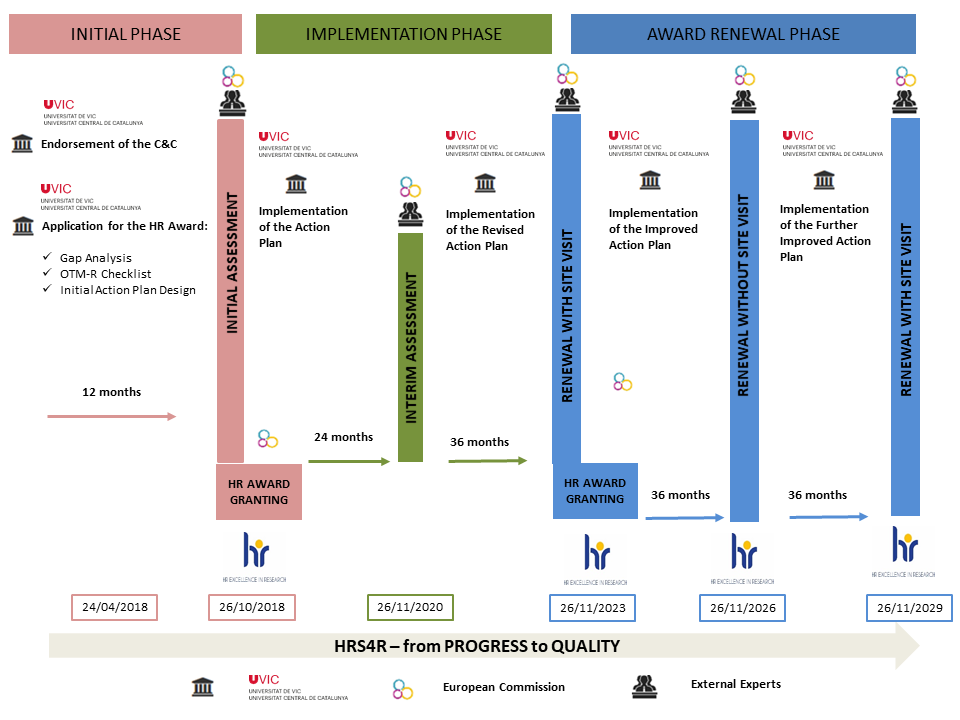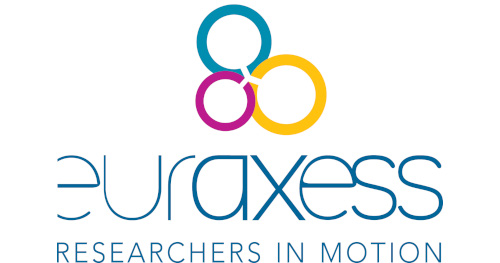The Human Resources Strategy for Researchers (HRS4R)
The Human Resources Strategy for Researchers (HRS4R) is an initiative of the European Commission to encourage research institutions to implement the European Charter for Researchers and the Code of Conduct for the Recruitment of Researchers (“C&C”).
Its specific application aims to promote and improve recruitment, working conditions and research careers, thus contributing to the development of the European Research Area.
Research institutions that act in accordance with the principles of “C&C” are authorised to use the HR Excellence in Research logo:

This "Excellence in Research Human Resources" logo is a public recognition of research institutions that have made progress in aligning their human resources policies with the principles defined in the "C&C". Institutions that have been awarded the logo have the right to display it to highlight their commitment to the implementation of fair, transparent recruitment and evaluation of the careers of their research staff.
UVic-UCC takes into account and supports the recommendations of the European Commission containing the "European Charter for Researchers" and the "Code of Conduct for the Recruitment of Researchers". It also undertakes, in accordance with its internal policies, to develop its human resources strategy by adhering to the recommendations and principles set out in the Charter and the Code and to guarantee transparency, accessibility and equity, and the pursuit of excellence in hiring researchers.
The procedure for obtaining this quality seal consists of five phases:
- Internal analysis of the institution according to the principles of the European Charter for Researchers and the Code of Conduct
- Development and publication of an action plan
- Examination and approval of the logo by the European Commission
- Implementation and self-assessment of the action plan (every two years)
- External assessment (every four years)
HRS4R process at UVic-UCC
The procedure for adhering to these Principles of Conduct and Contracting Excellence consists of three phases, of which UVic-UCC reached the first initial phase on 26 October 2018.

EURAXESS supports researchers, whatever their area of specialisation, nationality and destination, in important administrative matters concerning transfer. Through advice on topics such as European R&D&I funding, visa processing and recognition of degrees, among others, the aim is to facilitate the process of arrival and integration of scientists to the destinations chosen for the development of their research careers.

EURAXESS is a European Commission initiative with more than 300 research support centres and 40 affiliated countries. It acts as a support for the achievement of strategic objectives of the European Research Area (ERA) such as the removal of barriers to mobility, action and retention of research talent in Europe.
To pursue these objectives it has the following instruments:
- EURAXESS services: advice on research mobility (administrative procedures and legal requirements).
- EURAXESS Jobs: publication of R&D&I job offers by the interested entity, and publication of researchers' CVs.
- EURAXESS rights: European Commission recommendations for attracting research talent (Code of Conduct for the Recruitment of Researchers, the European Charter for Researchers and the Science Visa).
- EURAXESS links: connection of the European research community worldwide, access to forums, databases, newsletters, e-mail alerts, etc.
For more information: https://euraxess.ec.europa.eu/
The HR Excellence in Research Project
In March 2005 the European Commission adopted the European Charter for Researchers and the Code of Conduct for the Recruitment of Researchers (C&C), and recommended its implementation in Member States. These two documents are aimed at researchers and the institutions that hire them and are key elements in European Union policy to make research an attractive career. This is an essential part of the strategy to stimulate economic growth and employment within the European Union.
The European Charter for Researchers brings together a number of general principles and requirements that specify the role, responsibilities and rights of researchers and the entities that employ and fund researchers.
The aim of the Charter is to ensure that the nature of the relationship between researchers and funders or employers fosters the generation, transfer, distribution and dissemination of knowledge and technological advances, and also the professional development of researchers. The Charter also recognises the value of all forms of mobility as a means of extending the professional development of researchers.
The European Charter for Researchers covers, among other things:
- Recognition of the profession
- Career development
- Promoting mobility
For more information: https://cdn5.euraxess.org/sites/default/files/brochures/eur_21620_es-en.pdf
The Code of Conduct for the Recruitment of Researchers consists of a number of general principles and requirements that employers and funders must follow when designating or hiring researchers. These principles and requirements must ensure compliance with principles such as transparency in the recruitment process and equal treatment of all candidates, especially with regard to the development of an attractive, open, sustainable European employment market for researchers, and complement those described in the European Charter for Researchers.
The Code of Conduct for the Recruitment of Researchers covers, among other things:
- Principles of hiring
- Selection criteria
- Post-doctoral appointments
For more information: https://cdn5.euraxess.org/sites/default/files/brochures/eur_21620_es-en.pdf
OTM-R is one of the pillars of the European Charter for Researchers and, in particular, of the Code of Conduct for the Recruitment of Researchers.
The aim of OTM-R is to ensure that the best candidate is hired for each position, providing benefits for research staff and institutions, and enhancing the European Research Area. Specifically, the OTM-R contributes to making research careers more attractive and ensures equal opportunities for all candidates, while facilitating mobility.
OTM-R includes 23 principles in 5 main areas:
- OTM-R system
- Advertising and application phase
- Evaluation and selection phase
- Appointment phase
- Overall assessment
In order to make it easier for research centres to implement OTM-R practices, the European Commission has a computer package that allows research centres to review their current recruitment policy and improve it when necessary. The package includes guiding principles on what an OTM-R-like system should be like with a checklist for institutions, which serves as a self-assessment tool to compare current practices with these principles and a step-by-step guide to improve (when and where necessary) the OTM-R practices of the organisation.
Main C&C areas
The 40 C&C principles are grouped into four thematic areas, specifically distributed as follows:
- Freedom of research
- Ethical principles
- Professional responsibility
- Professional attitude
- Contractual and legal obligations
- Responsibility
- Good practices in research
- Dissemination and exploitation of results
- Commitment to society
- Non-discrimination
- Evaluation systems
- Recruitment
- Recruitment (Code)
- Selection
- Transparency
- Judgement of merits
- Variations in the chronology of CVs
- Recognition of mobility experience
- Recognition of qualifications
- Seniority
- Post-doc appointments
- Recognition of the profession
- Research environment
- Working conditions
- Stability and continuity of employment
- Financing and salaries
- Gender balance
- Career development
- Promoting mobility
- Access to career services
- Intellectual property
- Co-authorship
- Teaching
- Complaints and appeals
- Participation in decision-making bodies
- Relationship with supervisors
- Supervision and management tasks
- Continuing professional development
- Access to research training and ongoing development
- Supervision
University of Vic - Central University of Catalonia (UVic-UCC)
The UVic-UCC is a young university, officially recognised in May 1997. It is governed by the Balmes University Foundation, whose Board of Trustees comprises representatives of regional and local government bodies, economic and social agents. This combined model of independent management and public control guarantees flexible, accountable and efficient government.
The academic model is student-centered, fostering personal growth in the context of European values and comprehensive life wide education. In terms of transparency, UVic-UCC has been ranked as the most transparent Spanish HE institution, either public or private, which endorses its full commitment to attain completely Open, Transparent, Merit-Based recruitment policies.
With a commitment to attracting the best research talent through open and transparent recruitment policies, UVic-UCC endorsed the European Charter for Researchers and the Code of Conduct for the Recruitment of Researchers on 24 March 2014, and two years later, in 2016, began the process to obtain the HRS4R quality seal. In October 2018, UVic-UCC obtained the HRS4R quality seal.
HRS4R implementation commitees
Steering Committee
- Lidia Munmany, Head of the Research Management Project Office (HRS4R Coordinator)
- Eva Espasa, Vice-Rector of Research and Technology Transfer
- Albert Juncà, Vice-Rector of Teaching and Research Staff
- Josep Bau, Vice-Rector for International Relations
- Marta Otero, Director of the Doctoral College
Technical Committee
- Lidia Munmany, Head of the Research Management Project Office (HRS4R Coordinator)
- Mireia Triquell, Director of Talent Policy (Human Resources)
- Elisabet Dachs, Director of the Research and Technology Transfer Office (OTRI)
- Ricard Giramé, Director of Quality
Process documentation
Initial phase
- UVic-UCC_ C&C letter of endorsement
- UVic-UCC_ GAP analysis
- UVic-UCC_ Action plan
- UVic-UCC_ Initial phase assessment
Self-assessment phase
- UVic-UCC_ HRS4R Updated Action Plan
- UVic-UCC_HRS4R Updated Action Plan (may 2024)
- UVic-UCC Política Open, Transparent and Merit-based Recruitment (OTM-R)
UVic-UCC HR Excellence-Areas of Action